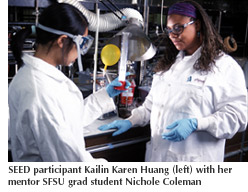| |
|||||
|
Chemistry transforms young lives | ||||
|
August 26, 2004 |
|||||
 Anyone
passing by Thornton Hall room 719 during the summer might be surprised
by the goings on. The students bent over beakers look a little
too young
for this college chem lab and their teachers seem not much older. The
truth is they are all students. Some are high schoolers; the others are
SFSU graduate students who gave up a large chunk of their summer and
volunteered to show disadvantaged youth a viable career path. Anyone
passing by Thornton Hall room 719 during the summer might be surprised
by the goings on. The students bent over beakers look a little
too young
for this college chem lab and their teachers seem not much older. The
truth is they are all students. Some are high schoolers; the others are
SFSU graduate students who gave up a large chunk of their summer and
volunteered to show disadvantaged youth a viable career path.
Project SEED (Summer Educational Experience for the Disadvantaged) was developed by the American Chemical Society (ACS) more than 35 years ago to offer exposure to the field of chemistry to high school students who might not otherwise consider chemistry as a career. ACS relies on donated funding to furnish stipends for the high school students and keep the program alive. Of all Project SEED participants over the years, 89 percent have gone on to higher education, 66 percent majored in science and 75 percent of those chose careers as chemists. A student who participated last summer at SFSU went on to become a semi-finalist in the prestigious Siemens Westinghouse competition in math, science and technology. Elaine Yamaguchi, a regional coordinator for SEED and staff scientist at ChevronTexaco, says that SFSU's participation in Project SEED stands out. "I give the chemistry faculty and students at State a lot of credit," she says. "The grad students have really made the program their own." "It's about way more than science," says Teri Gertsman, who volunteered to be a Project SEED mentor on a whim the summer before she was to begin law school. "I was so moved by the experience I decided right then and there to change my direction in life." Soon after, she received her master's degree in chemistry and volunteered for the program at State for several years until this summer, when her Ph.D. work took her out of state. "It's the mentoring thing I like," says grad student Nichole Coleman. She and her husband are getting ready to welcome their first child and although she is working on her master's thesis, she is volunteering for SEED. In 1990 Coleman was a junior at John F. Kennedy high school in Richmond when her SEED experience at State cemented her plans for the future. This summer Coleman mentored Kailin Karen Huang, a Galileo High School junior and immigrant from Guang Zhou, China. The pair's work is anything but kid's stuff. They assisted on faculty adviser Cliff Berkman's study funded by the National Cancer Institute and National Institutes on Health to develop chemical inhibitors to the enzyme PSMA (prostate specific membrane antigen) that could combat prostate cancer. "I didn't know very much about organic chemistry when we started," says Huang. "But Nichole showed me that patience is a large part of it." She and Coleman spent the summer conducting experiments to develop a specific series of inhibitors of the PSMA enzyme. Each August Project SEED culminates with presentations made by the high school students to assemblies of local ACS members. Huang, like all of her peers in the program, created a Power Point presentation showing the details of her collaboration with Coleman. Like her mentor 14 years ago, Huang is giving a career in science serious consideration and SFSU tops her list of college choices. -- Denize
Springer
|
|||||
 |
1600 Holloway Avenue, San Francisco, CA 94132 (415) 338-1111 |